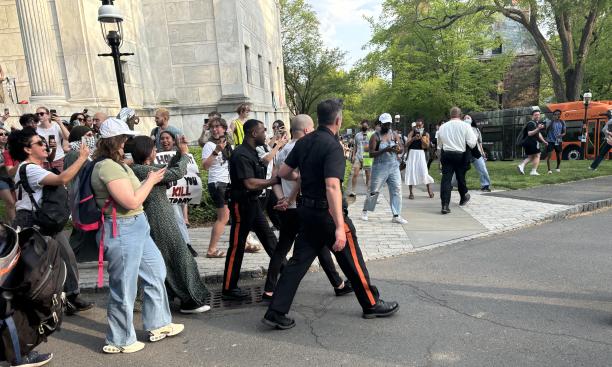
Editor’s Note: This story has been updated to clarify details of the meeting.
The 13 Princeton students who were arrested during the pro-Palestinian demonstrations on campus are unlikely to face penalties greater than probation, the University said in a statement Monday night.
The students will be able to participate in end-of-year activities and graduation, according to the statement. Hours earlier, faculty members voted 154-136 in favor of granting amnesty to the students at a special meeting held at Richardson Auditorium.
The meeting lasted more than an hour and a half, and roughly 300 of the more than 1,000 faculty members attended. Eight who were present abstained from voting.
President Christopher Eisgruber ’83 opened the meeting by telling faculty that the vote may be meaningless as faculty do not have authority to override the University’s disciplinary process, according to two faculty members who were in attendance, one of whom requested anonymity. Throughout the meeting, faculty members were allowed to make brief statements to voice their opinions on the proposal. After 6 p.m. the vote was taken using an electronic system so that votes were confidential.
“It really was unclear what we were doing,” Peter Ozsváth, professor of mathematics, told PAW. “But we all dressed up and had a good time.”
Eisgruber said in an email statement Monday night: “I’m grateful to members of the faculty present at the meeting for having a civil discussion about a difficult set of issues. I appreciate the care they feel for our students as well as their concerns around both violations of University policy and the need for integrity of University procedures.”
Fifteen protesters were arrested in two separate incidents last month: on April 25, when students first set up an encampment in McCosh Courtyard, and on April 29, when demonstrators attempted to occupy Clio Hall. Thirteen of the 15 are Princeton students; one is a postdoctoral researcher and another is a student at Princeton Theological Seminary.
The meeting was scheduled by Eisgruber in response to a series of proposals by six faculty members. Only one proposal was addressed in the meeting, as Eisgruber noted in a May 10 memo that it was unclear whether the other five proposals are within the jurisdiction of the faculty.
That proposal called “for the granting of amnesty to students and other affiliates involved in peaceful free speech and assembly for justice in Palestine.” It was initially amended on the advice of the Office of General Counsel (OGC) to be a recommendation from the faculty and to call for leniency instead of amnesty, according to a May 17 memo from Eisgruber. However, at the start of the May 20 meeting, a motion was passed to restore the wording of amnesty in the proposal.
“The faculty lacks authority to unilaterally change or force the University to change duly-established disciplinary procedures for individual students, groups of students, or students as a whole, or any other University constituency,” according to OGC’s legal opinion, which was included in the memo.
The opinion goes on to examine the proposal’s call for amnesty for “all University affiliates” involved in the encampment. The Board of Trustees has ultimate authority over faculty discipline, the opinion said, and the faculty has no role in disciplinary matters related to administrative staff or those in non-faculty academic positions, such as postdoctoral research scholars.
While emotions were high, Ozsváth and the other faculty member told PAW the meeting remained civil. Concerns for the students, the role of the faculty, and whether the disciplinary process has been fair were among the topics discussed.
“On the whole we behaved well and we’re professional,” Ozsváth said. “We might have disagreements about things [but] by and large I would say that I’m satisfied with the way we handle our differences and I’m very impressed with our president. I don’t agree with everything that he does, which I think is probably a sign of great leadership.”
The other five proposals initially presented to the faculty included calling for the establishment of a special committee to study and disclose the military scope of the University’s endowment, Princeton to divest from Israel, the creation of a program in Palestinian studies, an immediate ceasefire in Gaza, and a faculty boycott of all Israeli businesses and institutions. Ruha Benjamin, Curtis Deutsch, Lidal Dror, Molly Greene *93, V. Mitch McEwen, and Dan-el Padilla Peralta ’06 presented the proposals on May 8.
The meeting was moved from its usual location in Nassau Hall’s Faculty Room to Richardson Auditorium in anticipation of large attendance. The week prior, on May 13, faculty were seen lining up outside of Nassau Hall, unable to get into an informal meeting to discuss the upcoming special meeting.
Representatives of the campus press, including PAW, typically attend faculty meetings as “observers,” a status outlined in Princeton’s Rules and Procedures of the Faculty. But the rules also allow the Faculty Advisory Committee on Policy to declare sessions closed to observers, which the committee elected to do for the May 20 meeting.
